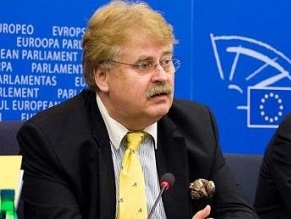|
World Jewish News

Elmar Brok chairs the European Parliament's Committee on Foreign Affairs.
|
2014 European Elections: Elmar Brok
17.03.2014, Jews and Society In view of the European Parliament elections, from 22-25 May 2014, when 375 million EU citizens in 28 member states will choose their 751 representatives, the European Jewish Press (EJP), in partnership with the European Jewish Association (EJA), sent current Members of the European Parliament written questions on topics of interest and concern to European Jewry. EJP will regularly publish their answers to these questions.
Since the entry into force of the Lisbon Treaty in 2009, the European Parliament has been given more say in policymaking as it plays an important role in shaping European policies. It has also a role in determining who should become the next President of the European Commission, the EU's powerful decision-making body.
Elmar Brok is a German Member of the European Parliament since 1980.
A member of the Group of the European People's Party (Christian Democrats), the largest in the parliament, Mr Brok chairs the important Committee on Foreign Affairs.
Q.Are you worried about the reported rise of populist, extremist and eurosceptic parties?
EB : As always a economic and social crisis is helpful to such critics. The Europe`s way out of the crisis will damage the future of these parties. The EPP will fight them in the campaign and I am sure they will only hold a minority without in influence in the next EP.
Q. How should the European Parliament support the fight against rising anti-Semitism in Europe?
European integration is in itself the best weapon against nationalism and anti-Semitism. The next EP will follow the line that anti-semitism is against our values and in certain cases unlawful.
Q. Is delegitimisation of Israel a ‘politically correct’ form of anti-Semitism?
EB : Any delegitimisation of a safe, Jewish state of Israel is politically incorrect; a correct form of anti-Semitism does not exist.
Q. Do you believe that boycotting Israeli products made in the West Bank settlements helps advance the peace process? Do you feel the European Parliament has an anti-Israel agenda?
EB : The EP supports the two-state solution. The EU has certain legal obligations, but the EP has always – as in the research matter- supported practical solution. The EP has no anti-Israel agenda.
Q. Are you concerned that labelling and/or boycotting these products will have negative consequences for the thousands of Palestinians working in the West Bank in Israeli companies?
EB : My previous answer already contains the answer to your question.
Q. Have you previously been to Israel? When? What was the purpose of your visit?
EB : Last year, I had discussions with the government, including the Prime Minister and the Knesset.
Q. Do you think the Israelis want peace with the Palestinians?
EB : I am convinced that the great majority of Israelis want to have peace.
Q. Can Iran be relied upon in its negotiations with the West on its nuclear programme?
EB : An agreement with Iran must be verifiable and can only be concluded if it is realistic to stop the Iranian bomb.
Q. Is there a future for Jews, especially the younger generation, in Europe?
EB : Oh yes, the Jews are part of Europe. When I see how positive the development of the Jewish community for example in Berlin is, then I am happy.
EJP
|
|
